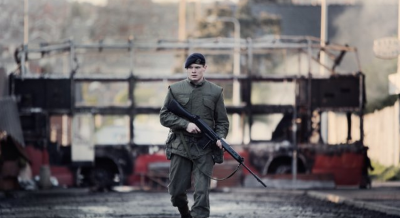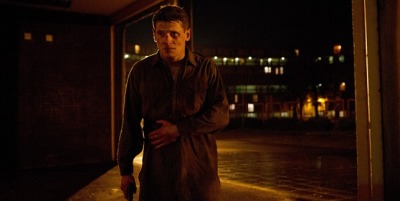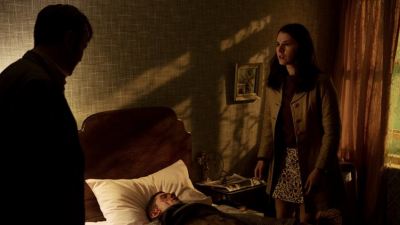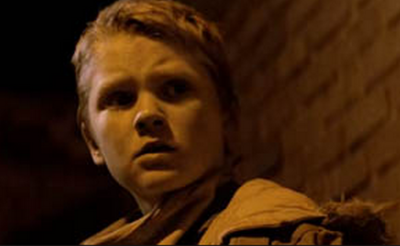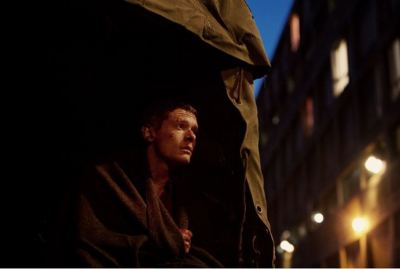A fascinating character study and study of the human condition during a time in history that sets the stage for what would become the worst bloodshed in the UK/Northern Ireland since the days of the ancient Picts and Celts, Yann Demange’s ‘71 is a standout. Focusing on realism and paying close attention to the political and moral ambiguities of the day (and which are still present today in analogous settings), Demange, working with a script by Gregory Burke, goes for the gusto with a gut-wrenching action thriller/ character drama that speaks to the conscience.
‘71 is told through the POV of Gary Hook, a soldier in the British Army. A fresh recruit, he and his unit have been deployed to Northern Ireland to the “Troubles” section of Belfast to help maintain peace and provide support in the pursuit of IRA members. On the night in question, Hook is pulled away from his unit amidst a riot and finds himself stranded in the strange city (here, Liverpool doubling as 1971 Belfast). Not knowing the people or friend from enemy, the Gaelic language which many speak, the city, or most importantly, even the “whys” of the conflict, Hook is a fish out of water. As the night passes, intrigues takes place, traitors are uncloaked, and Hook finds that friends can come from the most unexpected places.
Thanks to a strong performance by Jack O’Connell and equally strong visual and story construct by Demange and Burke, we are immersed in time. Gary Hook is our eyes and ears. A young man believing in the nobility of being in the military and serving his country yet questioning “why” this battle, “why” these people, and who’s who on the playing field, his mind is as murky as ours thus making the character and the story more resonant. We feel what he is feeling and that’s due to O’Connell and the superb camera work of Tat Radcliffe. The inner conflicts of the individuals that set the stage for ’71 riots and what would then come just a year later in real life, are presented in a balanced manner. We see the battles of father and daughter – help a young man who was plunked into “hell” or save one’s own skin and do the politically right thing and turn him in; the corruption of the upper echelon military and how war is manufactured and people manipulated and corrupted. All are powerfully and believably told. And through the youngsters, and particularly Barry Keoghan’s Sean, the battles become all too real, the struggle for self-independence and free-thinking powerfully obvious. The complexities of characters fueled by the very nature of the complexities of politics and religion is stingingly vibrant and engrossing.
Performances are all strong (although some of the sound mix with the very heavy Irish accents make some of the dialogue difficult to even hear), notably Babou Ceesay who as “Corporal” provides a conscience for a mamby pamby indecisive Brit, Lt. Armitage, the latter of whom never finds a backbone even by film’s end. A testament to Sam Reid in pulling off a spot on profiling of Armitage thanks to facial nuance and a wonderful use of pause for second-guessing in Armitage’s thought process.
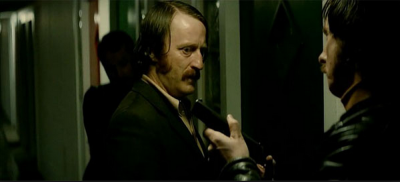
Always love seeing Richard Dormer and here is no different as he embodies the ethic of humanity with Eamon, a former military medic, who believes in saving human life above the question or friend or enemy. David Wilmot always seems to have a slightly smarmy or dichotomous edge to his characters and here, as Boyle, is no different; Boyle is a necessary player in any battle.
And again, as young Irish lad Sean torn between finding his own voice and conscience and obeying his elders, Barry Keoghan mesmerizes. Those eyes of his and the way the camera just lingers on them. At times looking like a deer in headlights, at times showing a cold icy steely inner anger, Keoghan’s silence lets his eyes show Sean’s inner conflict. Beautifully played and lensed. But the scene stealer – and heart stealer – of ’71 is then 13-year old Corey McKinley. With just 15 minutes of screen time, McKinley is killer every second he is on screen! Cocky, confident, adorably precocious. He is the heart, the essence of the price of war, the price of battle. Your heart will stop and virtually shatter in a pivotal scene involving McKinley and O’Connell.
Tat Radcliffe’s cinematography is inspiring. Hand held, immersive, vibrant – we are on the edge of our seats thanks to the constant movement and the superb editing of Chris Wyatt who just furthers the visceral heart-pounding thriller. The use of fog, the labyrinth nature of the city scape, the outstretched hands amidst so much fog and smoke that the hand is blurred, dizzying, steep us in the same whirlwind as Gary Hook. We feel the confusion of the man, the confusion of the situation and as with any conflict, don’t know which way to turn or which side to take.
And speaking of heart-pounding…..David Holmes music. That deep resonant percussion that is maintained through most of the film drives home the metaphor of troops feet pounding on the pavement as one as well as hearts pounding, blood coursing.
‘71 is a film as relevant today as real life events were in 1971 and packs a powerful punch at every turn.
Directed by Yann Demange
Written by Gregory Burke
Cast: Jack O’Connell, Sam Reid, Richard Dormer, David Wilmot, Babou Ceesay, Barry Keoghan and Corey McKinley

